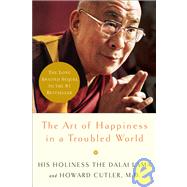
What is included with this book?
HIS HOLINESS THE DALAI LAMA is the spiritual and temporal leader of the Tibetan people. He is a recipient of the Wallenberg Award, the Albert Schweitzer Award, and the Nobel Peace Prize. He lives in Dharamsala, India. HOWARD C. CUTLER, M.D., is a diplomat of the American Board of Psychiatry and Neurology. Dr. Cutler maintains a private psychiatric practice in Phoenix, Arizona.
The New copy of this book will include any supplemental materials advertised. Please check the title of the book to determine if it should include any access cards, study guides, lab manuals, CDs, etc.
The Used, Rental and eBook copies of this book are not guaranteed to include any supplemental materials. Typically, only the book itself is included. This is true even if the title states it includes any access cards, study guides, lab manuals, CDs, etc.
Excerpted from The Art of Happiness in a Troubled World by Dalai Lama, Howard Cutler
All rights reserved by the original copyright owners. Excerpts are provided for display purposes only and may not be reproduced, reprinted or distributed without the written permission of the publisher.